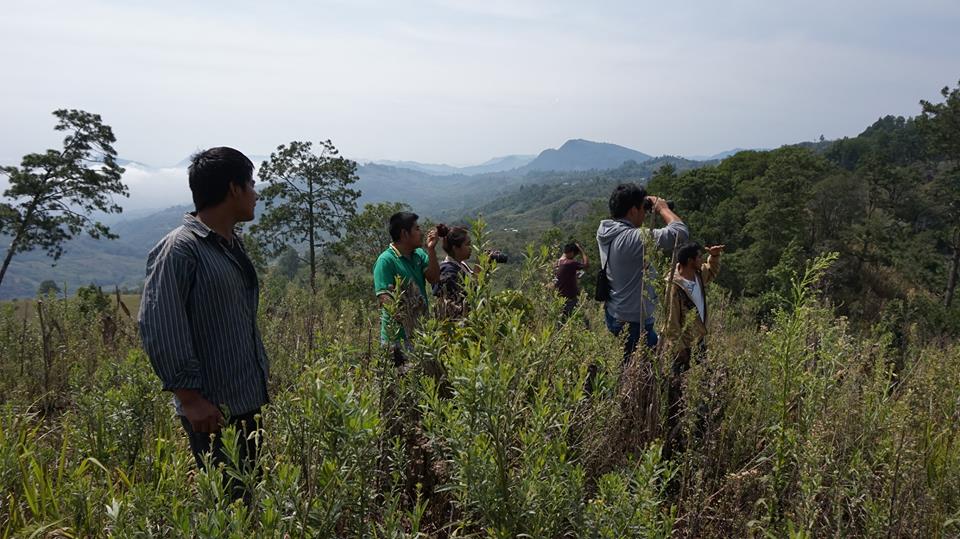Texto original en español publicado en: https://comunicares.org/2017/09/10/mensaje-para-internet-society-desde-el-otro-lado-del-muro/
Message for Internet Society, from the other side of the wall
Letter of a Young Tseltal whom was denied a VISA to receive an award from ISOC
After an extended international call, 25 young people who have made the Internet a tool of social transformation were recognized by the Internet Society (ISOC) and will meet and exchange experiences. Mariano Gómez, of the Ikta K’op Collective, a 23 year old Tseltal from Abasolo, Chiapas, was selected by ISOC after he installed a wireless Internet and Intranet network that provided connectivity and access to information to his community, which has no telephone or radio service.
The award will be presented this September 19 in Los Angeles, United States, but Mariano can’t attend since the US embassy in Mexico denied him a tourist visa, and with it the possibility to travel. So he wrote this letter to ISOC with words that speak of a society that is urged to listen to the voices of young people and to understand other ways of living in this world.
San Martín Abasolo, Ocosingo, Chiapas, México. Agosto 29 del 2017.
Internet Society
ISOC
“They wanted to bury us, but they didn’t know we are seeds.”
With all the respect you deserve, I send you a big hug from the entrance of the Lacandona Jungle in Chiapas, Mexico. I am Mariano and I am 23 years old, I am an indigenoius elementary school teacher.
I was recently nominated to be part of ISOC’s “25 Under 25” by Nicolás Pace from Altermundi (Argentina), a friend and brother who we met when he visited our community. We shared with him our small experience to bring internet to indigenous communities where traditional operators don’t reach, with an economic and social model that has the principles of the community life of indigenous peoples. We also worked on the development of a community Intranet service on our WiFi network, to share educational content, video, audio, files, Wikipedia and software. The service began as a school project called Intrabach, which has local content on a web server, an idea of Professor Luis Ramón Alvarado because there was no Internet in the community and he needed to teach things like writing an email or simply navigating websites. The curious thing about our project is that none of us are computer experts or technicians, we learned how to do this via autonomous study
I was very excited to learn I’d been selected to be a part of this celebration, I waited to share the news with my family and friends. Following the process I began to go through the procedures to apply for a visa. I used Networks for Diversity, Equity and Sustainability AC (Networks AC) to obtain an appointment, which I went to weeks ago and followed all the necessary steps. The day of my interview, which only lasted 5 minutes went like this: “I’m sorry don’t apply for a visa, the reason is explained in the following paper.”
At first I didn’t feel anything receiving this news, but as I left the place and walked I began to remember certain things. To begin, when I was notified and asked for help to complete the visa process, the US Consulate charged $160 USD for the procedure, which I managed to pay thanks to AC Networks, but even that didn’t bother me. What bothered was to get to the appointment, I had to make a 16 hour trip by truck to get to the capital of my country. I had to travel one day before the appointment and then walk through the city to get to the offices where it only took 10 minutes to take my photo and fingerprints. After that I had to wait another day to do the interview and then after being notified that I could not apply for the visa, having to take the truck back home.
The explanation they gave me for why I could not apply for a visa was the following, first: they couldn’t identify the address of my house, this is because I live in an indigenous community where the streets have no names; second: I have no bank account with any money to prove I have a high economic status, which is the way of the world, “he who has no money is worth nothing,” and third: I am a young man from a marginalized community in a region that’s considered to be one of the places most migrants travel from to go to the United States illegally (and many die trying). Even in the interview when they asked me if I speak two languages, I proudly answered yes. My mother tongue is Tseltal, descendant of the Mayan language and my second language is Spanish.
I write this letter to tell my story because it’s an example of the reality of thousands of indigenous and non-indigenous brothers who go through the same experience. It’s a reflection of a society with stereotypes that being of an indigenous people you are considered inferior, in which not having a bank account and large economic resources is synonymous with worthlessness. Racism is clearly visible, society ranked by skin color, language, religion and economic status to define a world model. What’s more in these times, they want to divide us with walls.
This is precisely why the Internet has been a tool to express what we feel, defend our territory, communicate with and relate to the outside world. We believe that with the projects we develop, that more communities can use this technology, not only that, but they can also use the knowledge itself.
At first I felt that my people had been insulted and I was upset, but after talking to friends and the community I thought again about writing this letter. I would like to participate online in the talks to know and share the experience. It’s not possible to compare the feeling and experience of being there in person, but it would help because I think not participating would be the same as standing by with my arms crossed in front of a system that doesn’t recognize these peoples, their way of life, their worldview. I believe in your help to be able to represent my people and our history.
I also request, if possible, or at least if it can be considered due to what happened, if the expenses that my trip would have cost (payment of airline ticket, hotel, food and other local expenses) could be donated to the Colectivo Ik’ Ta K’op of which I am a member, because we can use the money to get a proper server for the Intrabach (we are currently working with old equipment), as well as creating repeater nodes so we can support several communities to make links, so many more families would benefit. Actually my achievement is not only mine but also that of a large family of brothers that we have made, those involved in our collective, the communities requesting the service and all the sister organizations that have trusted and supported our initiative.
With a big hug I say goodbye, asking apologies and wishing the best.
Mariano Molox
Colectivo Ik’ Ta K’op
iktakop@techiocomunitario.net
(Traducción colaborativa realizada por Erin Gallagher y otrxs)
Image by Colectivo Ik’ Ta K’op

